A ‘sobering time’
The Korean intervention was riding on the tails of World War II—a war which was an uncontested victory with widely unchallenged motives.
In 2003, after the United States started dropping bombs on Baghdad, more than 1,000 Harvard students walked out of class and took to the streets in protest.
In 1953, alums recall a different sentiment.
Some cite Vietnam—which one member of the Class of 1953 describes as the war that “had time to go bad”—as a turning point in public opinion about American wars.
“We were still basking in the aftermath of World War II, when everybody served. It is easy to forget how many of us were on active duty,” Greeley says. “I will go to a gathering of people my age, 90 percent of men there will have been in the service at one time or another, one percent of their children will have been in the service.”
But World War II had a complicated effect on the members of the Class of 1953.
On the one hand, having grown up during the so-called “good war,” members of the Class of 1953 were more willing to accept without question the rectitude of the U.S. foreign policy. But on the other hand, the members of the Class of 1953 had heard stories about battle first-hand from buddies who had fought in World War II—and knew too much to trust newsreels from the Korean War that depicted goreless fighting.
“We saw upperclassmen go off and get killed in Korea,” Greeley says. “It was a pretty sobering time.”
Eric G. Wagner ’53 has similar memories—in particular, he recalls stories that one veteran friend told him before before Wagner entered his second and third year of college.
Wagner’s friend had served in World War II. He had witnessed the horrors of shellshock—one of the men in his unit had dived into a ditch to get out of the line of fire, but became catatonic once the man beneath him died.
One his friend’s first experiences in the service, Wagner said, involved picking up and carrying corpses with such severely broken bones that they drooped like rag dolls.
“He had an endless collection of stories,” Wagner says. “His best friend there was killed by friendly fire...They had to restrain him from killing the machine gunner.”
Despite the chilling stories he’d heard, Wagner—who later campaigned against the Vietnam War—didn’t resist the draft when he was called up after graduation.
When drafted, Wagner left his post-graduation job at IBM and served in the army in Japan for two years.
Read more in News
Sikh’s Sword Seized By School













